Sharing and getting strategy feedback guide
Last time around, we shared a detailed process for creating your plan. By now, you ought to be pretty happy with your new strategy - but before we move into the execution phase, it's time to share your strategic plan with others: get some feedback from your most trusted friends, colleagues and advisers.
Here's a quick recap of our series so far:
- Reflect on how you did in last year
- Writing your strategic plan
- Sharing your plan with others
- Launch and communicate your strategy
- 5 tips to help your strategy to succeed
Why you should (and shouldn't) share your strategic plan
Before we get into the how, let's look at some of the reasons why you might want to share your strategic plan with other people:
- Perspective
As obvious as it may seem, you might just have missed something. An opportunity, a threat, a market trend or anything else. Maybe you're just too close to the action and need a 2nd opinion. - Reflection
When you share your plan, you present your plan. Sometimes, hearing yourself read your plan out loud (even informally) can reveal things that you didn't think of when writing it down. You know those times when you have a great idea in your head, but it sounds really stupid when you try to explain it to someone else? Yeah, that's why. - Buy In
At the end of the day, you're going to need the help of others to execute your strategic plan. The sooner you get those people bought into the process and the more you listen to their opinions about the plan, the more bought in they'll be when it comes to doing their bit. - Transparency
Sometimes plans contain big changes that won't always please everyone. The sooner you can let them in on those changes, the less likely they'll be to feel blind-sided and react badly. - Inspiration
Great plans should be inspiring and bring optimism to the people you work with. Share your plan with them early, and realize the benefits of that effect sooner rather than later.
OK, so we've built a pretty compelling case for why you should share your strategic plan - in the interests of completeness, let's take a quick look at a few reasons why you might not want to.
If your plan contains commercially sensitive information, you should definitely factor this into your thinking. It doesn't mean you shouldn't share - but you might want to redact any critically sensitive elements or numbers first.
Second, if your plan runs the risk of upsetting people, make sure that you communicate it effectively and preferably personally to those people - giving them a chance to react, ask questions and feel like you've given them the respect they deserve if the plan will negatively affect them.
Who to share your plan with
One of the most common traps that entrepreneurs and leaders fall into, is thinking that they're the only ones who could possibly understand their business/project/idea/strategy.
In my own experiences, I've been genuinely surprised by the insight and value I've received from the most unexpected people imaginable. That's right, I've had business advice from my mother, my father, my grandmother, an 8 year old girl and a Nepalese taxi driver to name but a few. And here's the thing - they know what they're talking about!
Not because they're businessmen/women or because they're geniuses, but simply because they're people. People that see, that listen, that think, that buy. Like anything, the bigger range of opinions you can canvass, the more balanced an overview you can form.
Here's a selection of people you might want to involve and share your strategic plan with:
- Family members - not because they know your business or product, but because they know you, and I'd wager that you are a pretty important part of any new plan you've just come up with.
- A mentor / adviser - an obvious choice, this person probably has the best balance of knowledge between your organization, your ideas and you as a person.
- Your employees - they probably know your product better than anyone, and they'll be able to identify threats or opportunities better than anyone too.
- Your financiers - if you're receiving investment or other support from someone, get them involved asap - if they're onside, everything will be so much easier.
- Friends - these guys are probably close enough to what you're doing to help, but distanced enough to be rational and objective.
Aim to share your strategic plan with at least 4 different people, and try to ensure they're from a range of different groups if possible!
3 steps to effectively share your strategic plan
When it comes to the act of sharing and gaining feedback about your strategic plan, you'll want to follow a process something along the lines below.
Step 1: The Pitch
Decide what you want to share and how much detail you want to include. If you're using a cloud-based strategy tool like Cascade, make use of the export functionality which is designed exactly for this purpose.
At the minimum you're going to want to include:
- Your overall vision for the organization
- The key areas of focus that will get you there
- A selection of the major goals within each of these focus areas
- The timelines at a high level
- Some numerical indicators of 'what success looks like' - KPIs
We've prepared a strategic plan template that you can download here that includes all of that information or of course you can use a cloud system.
In addition, try prepping a 2 minute succinct pitch that sums it all up. Write it down and practice it a few times. This article has some great tips on how to do just that.
Step 2: Probing Questions
You could present your plan, and finish with "So....what do you think?". And that might work - but it also might not.
When you present your ideas in this way, they often come across as being more about seeking positive affirmation, than inviting genuine feedback.
People will tend to placate you and tell you that they like your ideas because they think that's what you want to hear.
Instead, try popping out a few carefully chosen probing questions - things like:
- Which part of this plan do you think I'm going to find the hardest to achieve?
- What do you think my employees will say about this plan?
- Would you go about delivering this vision the same way as I am?
The key is to make people feel comfortable to say what they really think. Don't present the plan as finished, present it as a work in progress on which you would really value their input.
Also, if they give you what sounds like negative feedback, listen, take notes, and thank them. Don't react right away as it will appear defensive and likely put them off from giving anything but platitudes in the future.
Step 3: Taking it all in
By the time you've met with 4 or 5 people, you should have gathered a fair bit of information about what people think of your new plan. Some of it will be contradictory, and that's just fine.
Some of it you will fundamentally disagree with, and that's fine too (just be sure to give each piece of feedback genuine consideration before you dismiss it).
You may also have further questions about some of the feedback - in which case don't hesitate to reach out to the provider and ask for clarification (they'll likely be flattered that you've taken their ideas so seriously).
Give yourself plenty of time to digest on and reflect on the feedback you receive. If you do decide to take any of the feedback on board, be sure to reach out to that person and let them know - maybe even show them an updated plan.
Finally, don't be overwhelmed! Sometimes, you can receive so much feedback that it makes your plan seem hopeless.
Be strong! You followed a solid process to get to this point, so don't just dismiss your ideas because of the feedback of one or two people that might not think it possible.
Sure, be reasonable and thoughtful, but no one knows your potential better than you or your people - so if those two parties think it can be done - it probably can :)
We'd love to hear your tips on how else the process of sharing can bring value to your new strategic plan. Leave a comment below, or via our social media channels.



.avif)


.png)
.jpg)
.jpg)



